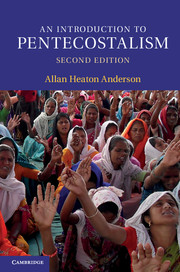Book contents
- Frontmatter
- Contents
- Acknowledgements
- Preface
- Abbreviations
- Chapter 1 Introduction
- Part I History
- Part II Analysis
- Chapter 9 Theology of the Spirit
- Chapter 10 Mission and evangelism
- Chapter 11 Bible and ‘full gospel’
- Chapter 12 Academy and ecumenism
- Chapter 13 Gender and society
- Chapter 14 Politics and economics
- Chapter 15 Globalization and prospects
- Bibliography
- Index
Chapter 14 - Politics and economics
Published online by Cambridge University Press: 05 June 2014
- Frontmatter
- Contents
- Acknowledgements
- Preface
- Abbreviations
- Chapter 1 Introduction
- Part I History
- Part II Analysis
- Chapter 9 Theology of the Spirit
- Chapter 10 Mission and evangelism
- Chapter 11 Bible and ‘full gospel’
- Chapter 12 Academy and ecumenism
- Chapter 13 Gender and society
- Chapter 14 Politics and economics
- Chapter 15 Globalization and prospects
- Bibliography
- Index
Summary
Pentecostals and politics
Pentecostals have not always felt comfortable with relating to wider society, but this is gradually changing. They have been accused of an apocalyptic spirituality and isolation that withdraws from ‘worldly’ issues like politics and the struggle for liberation and justice, and of proclaiming a gospel that either spiritualizes or individualizes social problems. The result of this, some say, has been a ‘pie in the sky’ approach that focuses on individualized mission and evangelism and either encourages accepting present oppressive conditions or leads to the ‘health and wealth’ gospel that makes material gain a spiritual virtue. The dichotomization of church and state into ‘secular’ and ‘spiritual’ spheres has continued. On the basis of Paul’s teaching in Romans 13 and related New Testament passages, Charismatic renewal theologian J. Rodman Williams (1918–2008) was typical of this approach. He advocated unqualified subjection to all ‘civil governments’, but that Christians should also be active citizens, be in political office and serve in the military in a ‘just war’ – paradoxically, while ‘loving’ the enemy. However, the ambiguity of Williams’ position, and that of many conservative Christians, becomes clear when he allows for certain circumstances where civil disobedience is appropriate because of a ‘higher loyalty’ to God. Amos Yong, in his ground-breaking study on a Pentecostal political theology, refers to the ‘uncritical nationalism, consumerism, and political quiescence in many pentecostal circles’. He suggests, however, that Pentecostals should not simply be categorized as ‘apolitical’ or even as ‘political’ because they have alternative, less conventional ways of being involved in politics.
- Type
- Chapter
- Information
- An Introduction to PentecostalismGlobal Charismatic Christianity, pp. 283 - 299Publisher: Cambridge University PressPrint publication year: 2013

